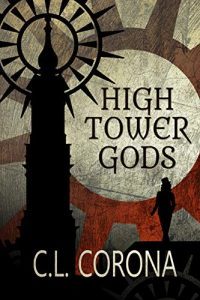Adrian Collins's Blog, page 190
January 2, 2021
REVIEW: The Dark Archive by Genevieve Cogman
The Dark Archive is an entertaining romp through the lighter side of fantasy. Being that it’s the seventh book in The Invisible Library series, I strongly suggest you read the previous books before diving into this one, not least because The Dark Archive isn’t the best of the books. Don’t get me wrong, there’s fun to be had, but it didn’t quite live up to the rest of the series.
 Irene is a Librarian, which is a guardian/treasure hunter for “dangerous” or one-of-a-kind books, scattered throughout different realities. She curates these works for the mysterious Library, which I would love to lose myself in. Irene also has the interesting ability to use spoken words to…affect things. For example, she can convince a door to twist in on itself so it can’t be forced open. Pretty useful, I would say. She also has a gift for attracting assassination and kidnapping attempts.
Irene is a Librarian, which is a guardian/treasure hunter for “dangerous” or one-of-a-kind books, scattered throughout different realities. She curates these works for the mysterious Library, which I would love to lose myself in. Irene also has the interesting ability to use spoken words to…affect things. For example, she can convince a door to twist in on itself so it can’t be forced open. Pretty useful, I would say. She also has a gift for attracting assassination and kidnapping attempts.
In The Dark Archive, Irene is joined by her usual crew: Kai, a dragon who looks an awful lot like a human; and Vale, a detective à la Sherlock Holmes. She’s also added a couple of new allies to the mix, the most notable being a fae apprentice named Catherine. Catherine is…annoying. When I think fae, my mind immediately jumps to the original lore, and from there to Brain Froud. Catherine was nothing like that. Instead, she spent a good chunk of the book whining about everything.
Irene was still a fun character, with a no-nonsense personality liberally sprinkled with the long-suffering patience that comes from dealing with a ton of nonsense. Vale, as always, was my favorite. He began living out a Master Criminal nemesis storyline, which poked fun at the Moriarties of the detective genre. Kai was mainly used to illustrate the tensions between the dragons and the fae (represented by Catherine). I’m sure this will bother some people, who prefer having Kai in a more central role. Personally, I liked the bit of sidelining just fine.
 My issue with The Dark Archive is that it is mainly filler, a bit of padding to connect storylines. Sure, it was fun, but it became a bit repetitive after a while. There can be only so many thwarted attempts at murder before it stops being interesting. Each chapter ends on a bit of a cliffhanger, which always rubs me the wrong way in books. I prefer the story itself to keep me interested, as opposed to the author feeling like they need to add a hook to keep me reading. Another problem I had is that the entire storyline could have been neatly summed up in the beginning of the next book, effectively eliminating the need for this installment at all. However, there are some genuinely delightful moments, and this would be the perfect palette cleanser after a heavy read.
My issue with The Dark Archive is that it is mainly filler, a bit of padding to connect storylines. Sure, it was fun, but it became a bit repetitive after a while. There can be only so many thwarted attempts at murder before it stops being interesting. Each chapter ends on a bit of a cliffhanger, which always rubs me the wrong way in books. I prefer the story itself to keep me interested, as opposed to the author feeling like they need to add a hook to keep me reading. Another problem I had is that the entire storyline could have been neatly summed up in the beginning of the next book, effectively eliminating the need for this installment at all. However, there are some genuinely delightful moments, and this would be the perfect palette cleanser after a heavy read.
The ending was a corker and sets things up to continue nicely in the next installment. There were some unexpected reveals that I think will pay off in the future. The Invisible Library series won’t go down as having the most incredible writing ever, but it is fun, which is just as important. While The Dark Archive didn’t blow me away, it was still an enjoyable read.
Read The Dark Archive by Genevieve Cogman
The post REVIEW: The Dark Archive by Genevieve Cogman appeared first on Grimdark Magazine.
January 1, 2021
REVIEW: Sistersong by Lucy Holland
Lucy Holland’s Sistersong is an epic historical fantasy that needs to be on your radar. Released in April 2021, this story based on the ‘Twa Sisters’ folk ballad is set in a late Antique Britain after the Romans have left. Many thanks to Black Crow PR and Macmillan for sending me an advance review copy.
 Keyne, Riva and Sinne are the children of King Cador, three siblings with complicated relationships. Keyne is struggling to be perceived as the man he feels he is, although he was born a daughter, chafing against the confinements of tradition and religion. Riva, the middle child, possesses healing powers but is herself scarred from a childhood accident with fire. Sinne, their youngest sister is a flighty and free-spirited girl wanting to find love and happiness. Set among the historical background of the advent of the Saxons, and a court dominated by the monk Gildas and his Christian ideas is a tale of betrayal and forging your own fate.
Keyne, Riva and Sinne are the children of King Cador, three siblings with complicated relationships. Keyne is struggling to be perceived as the man he feels he is, although he was born a daughter, chafing against the confinements of tradition and religion. Riva, the middle child, possesses healing powers but is herself scarred from a childhood accident with fire. Sinne, their youngest sister is a flighty and free-spirited girl wanting to find love and happiness. Set among the historical background of the advent of the Saxons, and a court dominated by the monk Gildas and his Christian ideas is a tale of betrayal and forging your own fate.
Sistersong retells the story of the ‘Twa Sisters’ ballad, which can be found at least as far back as the seventeenth century, but Lucy Holland manages to craft this story, which might be familiar to many readers, into something fully her own. Combining some of my favourite elements of books in one, I loved Sistersong so much – an undisputed five stars from me and a spot on the top three books I’ve read in 2020. It is a retelling of legend, set in a medieval Britain and queer, all things that would attract me to a book. But it is also brilliantly written and full of memorable characters framing the narrative.
The story is told from the perspectives of the three siblings, all with their own distinct voice and perspective on the world, making them come to life. Keyne’s transmasculinity is approached with nuance within the constraints of the period – avoiding creating an inherently modern character, but one that fits the context of the story. His story was probably my favourite of the three points of view. That isn’t to say that his sisters aren’t just as interesting. Accompanied by a cast of secondary characters, such as the gender-fluid magician Myrdhin/Mori, the historical figure of Gildas, mysterious Tristan and their royal parents, Sistersong is a complex web of relationships and power struggles. Not least of all in terms of the tensions between Christianity and the Pagan traditions still present at the court. This cultural struggle dominates much of the atmosphere, which made me love the book even more. I honestly can’t find anything to criticise about Sistersong, it is a book that feels like it was written for me personally.
If you like poetic reimaginings of mythology, such as Madeline Miller’s Circe and The Song of Achilles, you need to make sure to pick up Sistersong as soon as it’s available.
Read Sistersong by Lucy Holland
The post REVIEW: Sistersong by Lucy Holland appeared first on Grimdark Magazine.
December 31, 2020
SFF books in 2021: What the GdM team can’t wait to read next year
Welcome to 2021, where the SFF books we’re excited about are just as good as those we loved from 2020, but hopefully with the world not on fire or drowning in plague this time! Prepare your TBR pile, because it is about to get an absolute hammering.Here are the SFF books in 2021 that our team cannot wait to get their hands on to read and review.
The Blacktongue Thief by Christopher Buehlman
Picked by Nate Aubin
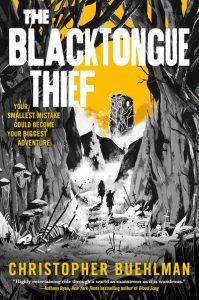 Set in a world of goblin wars, stag-sized battle ravens, and assassins who kill with deadly tattoos, Christopher Buehlman’s The Blacktongue Thief begins a ‘dazzling’ (Robin Hobb) fantasy adventure unlike any other.
Set in a world of goblin wars, stag-sized battle ravens, and assassins who kill with deadly tattoos, Christopher Buehlman’s The Blacktongue Thief begins a ‘dazzling’ (Robin Hobb) fantasy adventure unlike any other.
Kinch Na Shannack owes the Takers Guild a small fortune for his education as a thief, which includes (but is not limited to) lock-picking, knife-fighting, wall-scaling, fall-breaking, lie-weaving, trap-making, plus a few small magics. His debt has driven him to lie in wait by the old forest road, planning to rob the next traveler that crosses his path.
But today, Kinch Na Shannack has picked the wrong mark.
Galva is a knight, a survivor of the brutal goblin wars, and handmaiden of the goddess of death. She is searching for her queen, missing since a distant northern city fell to giants.
Unsuccessful in his robbery and lucky to escape with his life, Kinch now finds his fate entangled with Galva’s. Common enemies and uncommon dangers force thief and knight on an epic journey where goblins hunger for human flesh, krakens hunt in dark waters, and honor is a luxury few can afford.
Read The Blacktongue Thief
Sistersong by Lucy Hounsom
Picked by Fabienne Schwizer
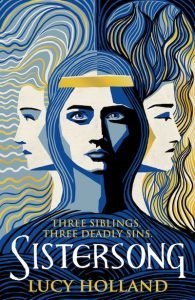 535 AD. In the ancient kingdom of Dumnonia, King Cador’s children inherit a fragmented land abandoned by the Romans.
535 AD. In the ancient kingdom of Dumnonia, King Cador’s children inherit a fragmented land abandoned by the Romans.
Riva, scarred in a terrible fire, fears she will never heal.
Keyne battles to be seen as the king’s son, when born a daughter.
And Sinne, the spoiled youngest girl, yearns for romance.
All three fear a life of confinement within the walls of the hold – a last bastion of strength against the invading Saxons. But change comes on the day ash falls from the sky, bringing Myrddhin, meddler and magician, and Tristan, a warrior whose secrets will tear the siblings apart. Riva, Keyne and Sinne must take fate into their own hands, or risk being tangled in a story they could never have imagined; one of treachery, love and ultimately, murder. It’s a story that will shape the destiny of Britain.
Read Sistersong by Lucy Hounsom
Jade Legacy by Fonda Lee
Picked by Tom Smith
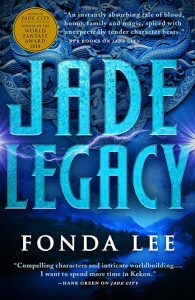 Jade, the mysterious and magical substance once exclusive to the Green Bone warriors of Kekon, is now known and coveted throughout the world. Everyone wants access to the supernatural abilities it provides, from traditional forces such as governments, mercenaries, and criminal kingpins, to modern players, including doctors, athletes, and movie studios. As the struggle over the control of jade grows ever larger and more deadly, the Kaul family, and the ancient ways of the Kekonese Green Bones, will never be the same.
Jade, the mysterious and magical substance once exclusive to the Green Bone warriors of Kekon, is now known and coveted throughout the world. Everyone wants access to the supernatural abilities it provides, from traditional forces such as governments, mercenaries, and criminal kingpins, to modern players, including doctors, athletes, and movie studios. As the struggle over the control of jade grows ever larger and more deadly, the Kaul family, and the ancient ways of the Kekonese Green Bones, will never be the same.
The Kauls have been battered by war and tragedy. They are plagued by resentments and old wounds as their adversaries are on the ascent and their country is riven by dangerous factions and foreign interference that could destroy the Green Bone way of life altogether. As a new generation arises, the clan’s growing empire is in danger of coming apart.
The clan must discern allies from enemies, set aside bloody rivalries, and make terrible sacrifices… but even the unbreakable bonds of blood and loyalty may not be enough to ensure the survival of the Green Bone clans and the nation they are sworn to protect.
Read Jade Legacy by Fonda Lee
Unfortunately, you’ll need to wait for the pre-order for this one, but keep a close eye out!
The Empire’s Ruin by Brian Staveley
Picked by Julia Frazer
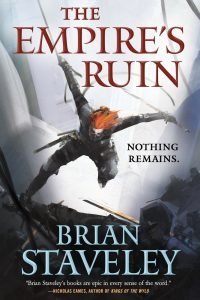 The Annurian Empire is disintegrating. The advantages it used for millennia have fallen to ruin. The ranks of the Kettral have been decimated from within, and the kenta gates, granting instantaneous travel across the vast lands of the empire, can no longer be used.
The Annurian Empire is disintegrating. The advantages it used for millennia have fallen to ruin. The ranks of the Kettral have been decimated from within, and the kenta gates, granting instantaneous travel across the vast lands of the empire, can no longer be used.
In order to save the empire, one of the surviving Kettral must voyage beyond the edge of the known world through a land that warps and poisons all living things to find the nesting ground of the giant war hawks. Meanwhile, a monk turned con-artist may hold the secret to the kenta gates.
But time is running out. Deep within the southern reaches of the empire and ancient god-like race has begun to stir.
What they discover will change them and the Annurian Empire forever. If they can survive.
Read The Empire’s Ruin by Brian Staveley
Library of the Dead by T. L. Huchu
Picked by James Tivendale
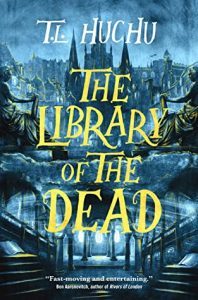 Sixth Sense meets Stranger Things in T. L. Huchu’s The Library of the Dead, a sharp contemporary fantasy following a precocious and cynical teen as she explores the shadowy magical underside of modern Edinburgh.
Sixth Sense meets Stranger Things in T. L. Huchu’s The Library of the Dead, a sharp contemporary fantasy following a precocious and cynical teen as she explores the shadowy magical underside of modern Edinburgh.
When a child goes missing in Edinburgh’s darkest streets, young Ropa investigates. She’ll need to call on Zimbabwean magic as well as her Scottish pragmatism to hunt down clues. But as shadows lengthen, will the hunter become the hunted?
When ghosts talk, she will listen…
Ropa dropped out of school to become a ghostalker. Now she speaks to Edinburgh’s dead, carrying messages to the living. A girl’s gotta earn a living, and it seems harmless enough. Until, that is, the dead whisper that someone’s bewitching children–leaving them husks, empty of joy and life. It’s on Ropa’s patch, so she feels honor-bound to investigate. But what she learns will change her world.
She’ll dice with death (not part of her life plan…), discovering an occult library and a taste for hidden magic. She’ll also experience dark times. For Edinburgh hides a wealth of secrets, and Ropa’s gonna hunt them all down.
Read The Library of the Dead by T.L. Huchu
The Thorn of Emberlain by Scott Lynch
Picked by Charles Phipps and Eugene Vassilev
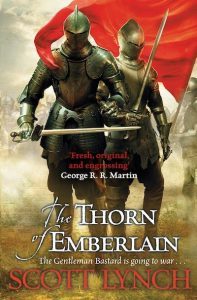 Locke Lamora, thief, con-man, pirate, political deceiver is back, and now he must become a soldier.
Locke Lamora, thief, con-man, pirate, political deceiver is back, and now he must become a soldier.
A new chapter for Locke and Jean and finally the war that has been brewing in the Kingdom of the Marrows flares up and threatens to capture all in its flames.
And all the while Locke must try to deal with the disturbing rumours about his past revealed in The Republic of Thieves. Fighting a war when you don’t know the truth of right and wrong is one thing. Fighting a war when you don’t know the truth of yourself is quite another. Particularly when you’ve never been that good with a sword anyway…
(I’m also well aware we’ve picked this book two or three years straight now … Ed.)
Read The Thorn of Emberlain by Scott Lynch
Unfortunately, you’ll need to wait for the pre-order for this one, but keep a close eye out!
She Who Became the Sun by Shelley Parker-Chan
Picked by Elizabeth Tabler
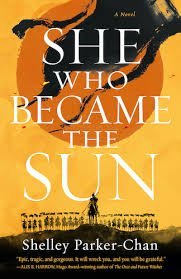 Mulan meets The Song of Achilles; an accomplished, poetic debut of war and destiny, sweeping across an epic alternate China.
Mulan meets The Song of Achilles; an accomplished, poetic debut of war and destiny, sweeping across an epic alternate China.
“I refuse to be nothing…”
In a famine-stricken village on a dusty yellow plain, two children are given two fates. A boy, greatness. A girl, nothingness…
In 1345, China lies under harsh Mongol rule. For the starving peasants of the Central Plains, greatness is something found only in stories. When the Zhu family’s eighth-born son, Zhu Chongba, is given a fate of greatness, everyone is mystified as to how it will come to pass. The fate of nothingness received by the family’s clever and capable second daughter, on the other hand, is only as expected.
When a bandit attack orphans the two children, though, it is Zhu Chongba who succumbs to despair and dies. Desperate to escape her own fated death, the girl uses her brother’s identity to enter a monastery as a young male novice. There, propelled by her burning desire to survive, Zhu learns she is capable of doing whatever it takes, no matter how callous, to stay hidden from her fate.
After her sanctuary is destroyed for supporting the rebellion against Mongol rule, Zhu uses takes the chance to claim another future altogether: her brother’s abandoned greatness.
A lush, fresh literary voice merges with commercial appeal in this accomplished debut. Powerful and poetic, beautiful and brutal, She Who Became the Sun is a bold reimagining of the rise of the founding emperor of the Ming Dynasty.
Read She Who Became the Sun by Shelley Parker-Chan
Mortis by John French
Picked by Chris Napier
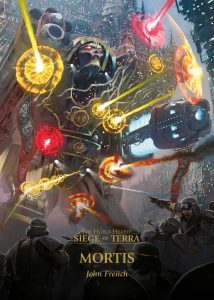 The victories of Saturnine and the sacrifices of the Eternity Wall space port have faded into the hope of yesterday. Denied but not defeated, the traitors intensify their assault on the Imperial Palace. With the principal space ports in Horus’ hands, the Warmaster now drains the heavens of his reserves. As the pressure of the assault increases, the power of Chaos waxes. The waking lives of the defenders are filled with despair, while their dreams pull them in search of a false paradise. As the fabric of the defences fails and the will of those who stand on them cracks, Horus commands the Titans of the Legio Mortis to breach the walls. Against them stands the might of Mercury Wall and the strength of the Legio Ignatum. Ancient rivals, the god-engines of both Legions meet in battle, while within the walls a few desperate individuals seek a way to turn back the tide of the warp’s malign influence. Across Terra lost warriors and travellers make their way through wastelands and gardens of horror, towards home and an unknown future.
The victories of Saturnine and the sacrifices of the Eternity Wall space port have faded into the hope of yesterday. Denied but not defeated, the traitors intensify their assault on the Imperial Palace. With the principal space ports in Horus’ hands, the Warmaster now drains the heavens of his reserves. As the pressure of the assault increases, the power of Chaos waxes. The waking lives of the defenders are filled with despair, while their dreams pull them in search of a false paradise. As the fabric of the defences fails and the will of those who stand on them cracks, Horus commands the Titans of the Legio Mortis to breach the walls. Against them stands the might of Mercury Wall and the strength of the Legio Ignatum. Ancient rivals, the god-engines of both Legions meet in battle, while within the walls a few desperate individuals seek a way to turn back the tide of the warp’s malign influence. Across Terra lost warriors and travellers make their way through wastelands and gardens of horror, towards home and an unknown future.
Read Mortis by John French
Letters from the Well in the Season of the Ghosts by Raymond St. Elmo
Picked by Ryan Howse
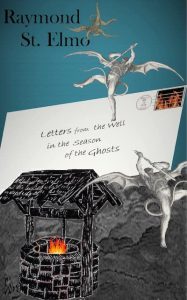 Maddy Rupert has a summer job in her dull home town of Hell, Texas. Assisting at the post office, known for receiving very strange letters. People around the world write to the dead, sending last laughs and sad ‘told you so’s. Maddy’s a quiet kid; if grownups want to pay her to drop the letters down a well shaft, she’ll nod her head and get it done.
Maddy Rupert has a summer job in her dull home town of Hell, Texas. Assisting at the post office, known for receiving very strange letters. People around the world write to the dead, sending last laughs and sad ‘told you so’s. Maddy’s a quiet kid; if grownups want to pay her to drop the letters down a well shaft, she’ll nod her head and get it done.
An easy, dull summer… till letters start coming up from the well. Addressed to Maddy Rupert.
Read Letters from the Well in the Season of the Ghosts by Raymond St. Elmo
The Wisdom of Crowds by Joe Abercrombie
Picked by Mike Myers
 Chaos. Fury. Destruction.
Chaos. Fury. Destruction.
The Great Change is upon us…
Some say that to change the world you must first burn it down. Now that belief will be tested in the crucible of revolution: the Breakers and Burners have seized the levers of power, the smoke of riots has replaced the smog of industry, and all must submit to the wisdom of crowds.
With nothing left to lose, Citizen Brock is determined to become a new hero for the new age, while Citizeness Savine must turn her talents from profit to survival before she can claw her way to redemption. Orso will find that when the world is turned upside down, no one is lower than a monarch. And in the bloody North, Rikke and her fragile Protectorate are running out of allies… while Black Calder gathers his forces and plots his vengeance.
The banks have fallen, the sun of the Union has been torn down, and in the darkness behind the scenes, the threads of the Weaver’s ruthless plan are slowly being drawn together…
Read The Wisdom of Crowds by Joe Abercrombie
Unfortunately, you’ll need to wait for the pre-order for this one, but keep a close eye out! The cover also isn’t available (image from the Sharp Ends print interior).
Empire of the Vampire by Jay Kristoff
Picked by Jodie Crump
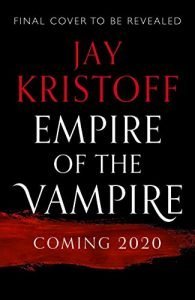 Twenty-seven years have passed since the last sunrise, and for almost three decades, the creatures of the night have walked the day without fear. Once, humanity fought bravely against the coldblood legions, but now, we exist only in a few scattered settlements—tiny sparks of light in a growing sea of darkness.
Twenty-seven years have passed since the last sunrise, and for almost three decades, the creatures of the night have walked the day without fear. Once, humanity fought bravely against the coldblood legions, but now, we exist only in a few scattered settlements—tiny sparks of light in a growing sea of darkness.
Gabriel de León is the last of the Silversaints, a holy order dedicated to defending realm and church, now utterly destroyed. Imprisoned for the murder of the vampiric king, Gabriel is charged with telling the story of his life.
His tale spans years, from his youth in the monastery of San Michon, to the forbidden love that spelled his undoing, and the betrayal that saw his order annihilated. Most importantly, Gabriel will tell the story of the Grail—the legendary cup prophesied to bring an end to the eternal night, whose location is known to a single person: A smart-mouthed teenage urchin named Dior.
Their journey with a band of unlikely allies would see Dior and Gabriel forge an unbreakable bond, and set the broken paragon on a road to redemption.
But now, the Grail is shattered. And with the cup of the Redeemer destroyed and the last Silversaint awaiting execution, what can bring an end to this undying empire?
From the New York Times bestselling author of the Nevernight Chronicle, Jay Kristoff, comes the first illustrated volume of an astonishing new dark fantasy saga.
Read Empire of the Vampire by Jay Kristoff
Unfortunately, you’ll need to wait for the pre-order for this one, but keep a close eye out!
She Dreams in Blood by Michael R. Fletcher
Picked by Chris Haught
 Drawn by the shards of his obsidian heart, Khraen follows the path south. The islands, largely ignored by the Wizard’s Guild, have become a refuge for the unwanted of the world. Necromancers and sorcerers rule warring tribes haunted by the ghosts of savage and primal gods.
Drawn by the shards of his obsidian heart, Khraen follows the path south. The islands, largely ignored by the Wizard’s Guild, have become a refuge for the unwanted of the world. Necromancers and sorcerers rule warring tribes haunted by the ghosts of savage and primal gods.
With each fragment Khraen discovers more of the man he was.
There was an Empire.
There was a god.
And she dreamed in blood.
Read She Dreams in Blood by Michael R. Fletcher
Unfortunately, you’ll need to wait for the pre-order for this one, but keep a close eye out! The cover also isn’t available (image from the Evil is a Matter of Perspective print interior).
Legacy of Light by Matthew Ward
Picked by Adrian Collins
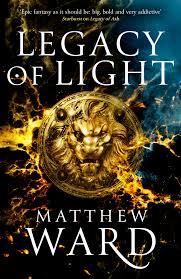 Warfare, myth and magic collide in Legacy of Light, the spectacular conclusion to Matthew Ward’s acclaimed Legacy trilogy.
Warfare, myth and magic collide in Legacy of Light, the spectacular conclusion to Matthew Ward’s acclaimed Legacy trilogy.
For the first time in many years, the Tressian Republic and the Hadari Empire are at peace. But war never sleeps.
In Tregard, Empress Melanna Saranal struggles to protect a throne won at great cost.
In Tressia, Lord Protector Viktor Droshna seeks to harness forbidden power to restore all he’s lost.
As the sins of the past are once more laid bare, every road leads to war. Darkness gathers, alliances shatter and one final battle looms. What hope remains, lies within the light.
Read Legacy of Light by Matthew Ward
Unfortunately, you’ll need to wait for the pre-order for this one, but keep a close eye out!
The post SFF books in 2021: What the GdM team can’t wait to read next year appeared first on Grimdark Magazine.
REVIEW: Sons of Rome by Doherty and Turney
I received an advanced review copy of Sons of Rome in exchange for an honest review. Thank you to Simon Turney, Gordon Doherty, and Head of Zeus.
I’ve been getting into more historical fiction this year, so when Head of Zeus approached me with their new Aries catalogue – an imprint of theirs that is focused on action and adventure books – I was pretty excited to see what they had on offer. I opted to pick up Doherty and Turney’s Sons of Rome as my first choice, and although it wasn’t the reading experience I was expecting, I had a great time with it.
“Now every journey has a story, but this one is a truly dark and tangled tale – one that would end, the very next day, in battle against my oldest friend…”
 Sons of Rome is set in the Roman Empire from the 3rd-4th century AD. It follows two main characters, Constantine and Maxentius, both in the first-person perspective. The two voices of the protagonists were unique and distinctive so there was never a risk of confusion over whose chapter I was reading. The main distinction between the two players is that Constantine’s journey is martial whereas Maxentius’ is more political. We follow both of them concurrently as they age from youth to adulthood. They meet fleetingly throughout their lives when their paths crossover and they consider each other firm friends. They are many well-crafted and memorable moments throughout Sons of Rome, and the violent circumstances with which the young protagonists first meet and then discuss wooden blocks is one of these occasions that has a lasting effect throughout the novel.
Sons of Rome is set in the Roman Empire from the 3rd-4th century AD. It follows two main characters, Constantine and Maxentius, both in the first-person perspective. The two voices of the protagonists were unique and distinctive so there was never a risk of confusion over whose chapter I was reading. The main distinction between the two players is that Constantine’s journey is martial whereas Maxentius’ is more political. We follow both of them concurrently as they age from youth to adulthood. They meet fleetingly throughout their lives when their paths crossover and they consider each other firm friends. They are many well-crafted and memorable moments throughout Sons of Rome, and the violent circumstances with which the young protagonists first meet and then discuss wooden blocks is one of these occasions that has a lasting effect throughout the novel.
“Rome is about honour and respect. You cannot fight corruption by corrupt means. Find another.”
The period depicted in this book is one that I know very little about, so went into it excitable and wide-eyed ready to get enveloped by the whole experience. It comes across that the authors really know this era and therefore could confidently and comfortably tell Constantine and Maxentius’ stories. There are battles and warfare, sometimes brutal, but this doesn’t take up as much page time as I was expecting. A lot of what takes place is political manoeuvring, moving the metaphorical pieces on the great game board. Marriages, family ties, betrayal, operating under a certain emperor, overcoming uprisings, etc… There is also a fair bit of persecution delivered to the Christians as some important figures see them as a risk to the old gods.
“Of course, I was wrong. In the end, it always comes down to blood and steel, doesn’t it?”
Sons of Rome is an impressive, addictive and fast-paced read, without being as action-focused as I’d initially hoped. The book doesn’t really work as a standalone, it’s more of a groundwork piece, building up the tension and intrigue; so I am expecting heaps of action and drama in the upcoming Masters of Rome. Later on in Sons of Rome, I really enjoyed seeing how Constantine and Maxentius would analyse and act on each other’s decisions and actions, and how their relationship as friends slowly changes. The sides and the pieces are well and truly in place on the board for the great game and I will definitely be reading the follow up as soon as I can to see how Maxentius’ and Constantine’s journies play out and what impact their lives have on each other and for the future of the Roman Empire.
Sons of Rome gets a solid four-star rating for the reading experience and, at the time I am writing this, a five-star rating for value for money, with the Kindle version of the novel only costing £0.99. Sons of Rome is an intriguing and highly polished piece of Historical Fiction that is well worth the asking price.
Read Sons of Rome by Doherty and Turney
The post REVIEW: Sons of Rome by Doherty and Turney appeared first on Grimdark Magazine.
December 30, 2020
REVIEW: Alice in Borderland
Set in an empty Tokyo, Alice in Borderland, a crazy Japanese sci-fi murder-fest is a brilliant romp well worth investing your time in if you like Battle Royale and other twisted game-master-kills-lots-of-people type movies. It’s fun, it’s brutal, and in true manga-to-screen style the actors chew the shit out of the scenery like Nicholas Cage drank a four pack of red bull before showing up to set.
The premise is simple: three young mates and a bunch of other unfortunates all-of-sudden find themselves in an empty Tokyo where every few days they are required to compete in a survival game. In that game, people die. Often, lots of people. In bloody and brutal AF fashion.
Our lead character Arisu is a bit of a drop-kick. He’s crazy intelligent, but invests his time into playing video games and drinking with his two best mates instead of his career like his brother and father expect. One day he ditches yet another interview and winds up standing alone in the street with his two mates and not another soul. When they meet a man in an alley who shouts about being finished, and is then zapped through the head with a laser from the sky, Arisu embarks on a bloody, crazy, and heartbreaking story in his quest to survive the game and find meaning in it.
The relationship between the three best friends is actually really well done. The lead up to the great change, flashbacks, and their character development throughout really ensured that when things happened, they mattered. I sometimes find it difficult to have an opinion on actors when their performances are dubbed in English, but they felt solid.
From a sci-fi perspective, it’s a well done premise, nicely backed up by fairly solid special effects that showcased the tech keeping them all trapped in the game. It’s kept a mystery throughout, and I enjoyed the fact they didn’t make any big reveals early on, slowly peeling back the story layers as Arisu made it further into the game.
The ending felt a little The Matrix series-y to me, making me wonder if the second season is going to go well or just be a ridiculous escalation of events that I’ll lose interest in after two episodes. If Alice in Borderland had of made an ending at the conclusion of this season I would have been 100% happy with that. But the setup for the second season, for this cynical TV reviewer, is that they should have put more effort into the ending and wrapped it after S1. Having said that, it’s not like I’m good at predicting these things, so bring on S2!
Catch Alice in Borderland on Netflix.
The post REVIEW: Alice in Borderland appeared first on Grimdark Magazine.
REVIEW: The Expanse Series 5 Episode 5 – Down and Out
The last episode of The Expanse really shook us up from every angle, with the Rocinante crew scattered across the system. And if you haven’t watched Episode 5 of this season, you need to leave right now. Spoilers abound; you have been warned.
There have been multiple asteroid impacts on Earth, where Amos is now trapped in a high-security jail. Alex and Bobbie are tracking some black marketeers. Naomi is now the prisoner of terrorist/freedom fighter Marco Inaros and their son Filip, while Holden just saw Fred Johnson assassinated and the protomolecule stolen by Inaros’ ‘Free Navy.’
Can we keep the pace up in Episode 5, Down and Out? Let’s see.
The episode starts with a quick recap of what’s gone before then moves to Drummer’s pirate fleet where the crew react to the news from Earth and Inaros’ pronouncement of the Belts freedom. Drummer receives an offer from Inaros to meet to discuss the future of the belt and decides to accept.
Amos wakes up under a pile of rubble inside Clarissa Mao’s cell, bathed in red emergency lighting. A guard helps Amos open the door but initially wants to keep Clarissa under lockdown. Amos says she’s responsible for his safety and he’s taking responsibility for Clarissa’s. The stairwell and elevator have been put out of action by the impact but Amos says there will be a maintenance ladder in the shaft. They can’t open it and Clarissa is still too doped, so they release another inmate to get the lift shaft open. It’s the same intense individual we saw last week.
Holden is on Tycho and trying to contact Naomi–he can’t contact his parents, Amos, or Alex. He and Bull interrogate Sakai, who is full of defiance.
Amos and the guards hatch a plan to go up the lift shaft with the aid of the modded inmate to rip open the panels concealing the maintenance shaft. I can’t see this going wrong at all.
Bobbie and Alex have resolved to keep tracking the black marketeers and watch them change course into a convenient rendezvous point.
Naomi is dropped off in the mess to have lunch with her old pals, plus Marco and Filip. She wants to leave but Marcos says she is free, but reminds her that she gave her ship to Filip. Naomi leaves and Marcos asks Filip what he hoped to achieve by bringing his mother. High level manipulation there.
Naomi tries to access a console but is locked out. Her old friend, Cyn tries to get her to help with some tech stuff but she turns on him and says she’ll never forgive him for allowing Marco to influence Filip. Cyn makes an impassionate case for why Belter extremism is justified.
Back at the jail and they are climbing up the lift shaft when one guard ‘falls’ while going up with Tiny, the modded inmate. Following this and aftershock rumbles through the ruins and lift falls down the shaft and there is daylight up ahead. Where there should be a building.
Naomi goes back to the now-empty mess to eat and her other old pal, Karal comes in and says she was glad when Naomi left before, cause she always thought she was better than everyone else. Karal reminds Naomi of the code she planted to blow up a ships reactor for Marco and says nobody is coming to save her. Naomi palms a knife from the mess.
She goes to the bridge and asks to speak to Marco, intending to kill him. She is so close to doing it, when Filip intercepts her and marches her out of the bridge, covering for her but dismissing her.
The group at the prison reach the surface and we see that the above ground portion of the prison has just been levelled. Tiny kills the guard nearest him and goes after the other. Amos tries to save her but gets ragdolled by the larger, modded man. As Tiny gets Amos in a choke grip and looks to drop him down the shaft, the surviving guard manages to shoot him and this allows Amos to backdrop him down the lift shaft. Fatality.
Amos tells the surviving guard to get clear, as Clarissa is clearly feeling her mods come back online. There is a panning shot showing the remains of the prison on the edge of a huge water-filled crater, which I guess used to be most of New England.
Certain that Marco has planted the reactor explosion code on the Roci, Naomi attacks Cyn and gets a message to Holden just in time before the Roci explodes.
Bobbie and Alex are watching the black market transfer and realise its whole ships being sold, then they get spotted and have to run from a missile. Eventually out of moves, Alex has to dump their reactor core and the episode ends with their fate uncertain.
Down and Out is a much less immediate episode than last week’s intense Gaugamela but it serves an important role in embedding the big hits from that episode. Basically, the situation remains desperate for everyone. On Earth, Amos is no longer stuck underground but he is with a psychologically unstable and physiologically modified felon and it’s clear that things like law, order, utilities, and communication are all out of commission for the foreseeable future.
Near Mars, Alex and Bobbie have discovered that the black market to Belter trade is more significant than they’d assumed and after discovering that are either dead or adrift.
With the Free Navy, Naomi finds herself in a hopeless situation with her old friends and child showing that loyalty to Marco outweighs loyalty to her and the possibility of getting away, never mind foiling him or saving her son seems remote.
Finally, out on Tycho, Holden has seen his best ally assassinated and his ship compromised, while also worrying for his missing girlfriend and family on the edge of an impact zone. He can’t hold his own house together, never mind save the system.
As usual, I want to draw attention to Naomi’s code-switching between English and Lang Belta–this week between different people in the same conversation. I love the attention to detail there, in both the writing, direction, and Dominique Tipper’s performance. Similarly, the performances of Belter defiance from the manipulative Marco and devoted Sakai are highlights of this episode.
Looking ahead, what lies in store for Naomi in the lair of her enemy? Can Amos survive Earth and/or Clarissa? Will Bobbie and Alex be alright and what can Holden hope to do to help any of them, or even himself?
What did you enjoy in this episode and what are you looking forward to as the story continues?
Episodes 1-5 of Season Five of The Expanse can be streamed via Amazon Prime – https://www.primevideo.com and new episodes are coming every Wednesday.
The post REVIEW: The Expanse Series 5 Episode 5 – Down and Out appeared first on Grimdark Magazine.
December 29, 2020
REVIEW: Red Hands by Christopher Golden
I received Red Hands from Christopher Golden’s literary agent via Grimdark Magazine after putting my hand up to provide an honest review. At the time I did not realise that this was the third instalment in a series featuring scientist and DARPA adventurer Dr Ben Walker (also known as ‘weird s**t expert’), although this did not detract from a tense and riveting read which cleverly melds both the well-worn thriller and horror genres and giving them an imaginative shot in the vein.
 The reader is thrown headfirst into this high stakes drama as early as chapter one when a car drives into a crowd in the small town of Jericho Falls who are happily putting on a 4th July parade. Unknown to the stricken bystanders, the blood-soaked driver who gets out of the vehicle is the carrier of a fatal infection, killing everyone he touches except for a young lass named Maeve Sinclair who whacks him with a baseball bat. Despite her brave efforts the dying driver infects Maeve by touching her, a few instants before he kicks the bucket.
The reader is thrown headfirst into this high stakes drama as early as chapter one when a car drives into a crowd in the small town of Jericho Falls who are happily putting on a 4th July parade. Unknown to the stricken bystanders, the blood-soaked driver who gets out of the vehicle is the carrier of a fatal infection, killing everyone he touches except for a young lass named Maeve Sinclair who whacks him with a baseball bat. Despite her brave efforts the dying driver infects Maeve by touching her, a few instants before he kicks the bucket.
To my and Maeve’s horror the fatalities only increased when she unwittingly touches and kills a few of her loved ones, another sudden plot twist which is both ghastly and cruel. Overcome by horror and remorse, Maeve runs away and is already deep in a wooded mountain while the authorities appear on the scene and try to pick up the pieces. Enter Ben Walker, dragged away from his family vacation to soon find himself collaborating with Maeve’s family to try and find the girl while outwitting a number of various government agencies and contract killers.
It is hard not to empathise with Maeve, who finds herself alone and grief-stricken, trying to overcome the trauma of having killed family members while trying to run for her life, resist the growing impulse to touch other human beings and also falling sicker and sicker by the minute. It’s a desperate state of affairs all round, with dark undertones soon added to her predicament when it becomes apparent that Walker’s efforts may not be enough to save her life. At all times the virus is an ever-present menace, with the mystery surrounding its origins leading me to turn the pages ever more frenetically to discover where, why and how it was started.
Walker’s wit and sarcasm also make for entertaining reading, while also complementing the novel’s haunting backstory. The secondary characters are also interesting, foremost of whom is the undeterred and strong biologist Rue Crooker, a close lady friend of Maeve’s injured father Ted. All throughout his yarn Golden’s crisp prose moves the story along satisfactorily while also successfully developing a number of secondary characters whose stories prevent the novel from becoming too predictable.
The novel’s plot should resonate with readers in what has been a pandemic year, since Maeve’s fellow town dwellers find themselves in a state of quarantine while seeking to get answers from government authorities that are hard to come by. Red Hands is a story that moves along at a brisk pace, filled with enough action, adventure, mystery and horror to appeal to fans of all or each genre.
4 stars.
Read Red Hands by Christopher Golden
The post REVIEW: Red Hands by Christopher Golden appeared first on Grimdark Magazine.
December 28, 2020
Best SFF books of 2020
Well, it’s been a hell of a year. Pretty much everything has been a little bit rubbish except for 2020’s book releases–so it’s time for Grimdark Magazine’s best SFF books of 2020. We have a decent mix of fantasy and sci-fi, and even some urban fantasy. Something for everybody, picked by our team of reviewers.
Without further ado, in no particular order, I give you our best SFF books of 2020.
Black Sun by Rebecca Roanhorse
Picked by Julia Frazer
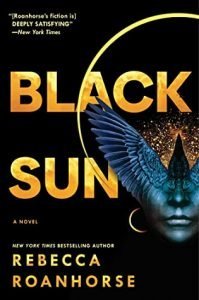 A rare and wonderful fantasy novel, Black Sun is one of the best books to be published in 2020. This thoroughly impressive work could stand alone, but the author has more books planned in the Between Earth and Sky series.
A rare and wonderful fantasy novel, Black Sun is one of the best books to be published in 2020. This thoroughly impressive work could stand alone, but the author has more books planned in the Between Earth and Sky series.
Read the rest of the review here.
Blurb:
A god will return
When the earth and sky converge
Under the black sun
In the holy city of Tova, the winter solstice is usually a time for celebration and renewal, but this year it coincides with a solar eclipse, a rare celestial event proscribed by the Sun Priest as an unbalancing of the world.
Meanwhile, a ship launches from a distant city bound for Tova and set to arrive on the solstice. The captain of the ship, Xiala, is a disgraced Teek whose song can calm the waters around her as easily as it can warp a man’s mind. Her ship carries one passenger. Described as harmless, the passenger, Serapio, is a young man, blind, scarred, and cloaked in destiny. As Xiala well knows, when a man is described as harmless, he usually ends up being a villain.
Crafted with unforgettable characters, Rebecca Roanhorse has created an epic adventure exploring the decadence of power amidst the weight of history and the struggle of individuals swimming against the confines of society and their broken pasts in the most original series debut of the decade.
Read Black Sun by Rebecca Roanhorse
Harrow the Ninth by Tamsyn Muir
Picked by Chris Napier
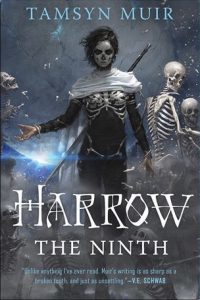 More of the brilliant world building and razor-sharp dialogue that made Gideon so much fun, a deeper exploration of just how messed up, fabulously capable and utterly determined Harrow is, and a plot which, when it finally resolves, is a masterpiece in complex, mind-bending storytelling.
More of the brilliant world building and razor-sharp dialogue that made Gideon so much fun, a deeper exploration of just how messed up, fabulously capable and utterly determined Harrow is, and a plot which, when it finally resolves, is a masterpiece in complex, mind-bending storytelling.
Read the rest of the review here.
Blurb:
She answered the Emperor’s call.
She arrived with her arts, her wits, and her only friend.
In victory, her world has turned to ash.
After rocking the cosmos with her deathly debut, Tamsyn Muir continues the story of the penumbral Ninth House in Harrow the Ninth, a mind-twisting puzzle box of mystery, murder, magic, and mayhem. Nothing is as it seems in the halls of the Emperor, and the fate of the galaxy rests on one woman’s shoulders.
Harrowhark Nonagesimus, last necromancer of the Ninth House, has been drafted by her Emperor to fight an unwinnable war. Side-by-side with a detested rival, Harrow must perfect her skills and become an angel of undeath — but her health is failing, her sword makes her nauseous, and even her mind is threatening to betray her.
Sealed in the gothic gloom of the Emperor’s Mithraeum with three unfriendly teachers, hunted by the mad ghost of a murdered planet, Harrow must confront two unwelcome questions: is somebody trying to kill her? And if they succeeded, would the universe be better off?
Read Harrow the Ninth by Tamsyn Muir
Kings of Heaven by Richard Nell
Picked by Charles Phipps and Tom Smith
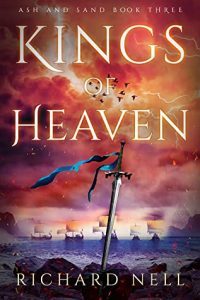 The book does provide a satisfying and conclusive ending to the storyline. Romances never come to be, peace comes at a price, and there is a good portion of the cast dead but the results are realistic to the events. Kings of Heaven is a perfect end to a grimdark tale.
The book does provide a satisfying and conclusive ending to the storyline. Romances never come to be, peace comes at a price, and there is a good portion of the cast dead but the results are realistic to the events. Kings of Heaven is a perfect end to a grimdark tale.
Read the rest of the review here.
Blurb:
In the final book of the Ash and Sand trilogy, Ruka, son of Beyla, faces the emperor of the world, yet even victory may not save his people…
With the death of his ally, Farahi Alaku, Ruka ‘Godtongue’ is alone. Or not exactly… The island prince Kale Alaku now haunts his mind, rattling within his once peaceful ‘Grove’, promising revenge and growing every moment in power. Meanwhile, the Pyu isles are in chaos; the coastal kingdom of the Tong is still Ruka’s enemy, and every day that passes brings the empire closer to destroying his dream of a new world for his people.
Once again, the son of Beyla will need the strength of his dark twin, Bukayag. Perhaps together they can unite three peoples, gather an army of ash, and defend or destroy their way to peace. But in the end, there can be only one king of heaven…
Read Kings of Heaven by Richard Nell
Nophek Gloss by Essa Hansen
Picked by Elizabeth Tabler
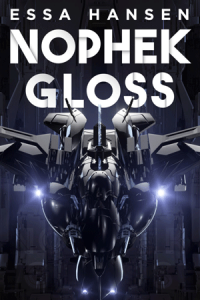 Nophek Gloss is a science fiction book for science fiction geeks. It is almost a love letter to those out there who find their passions in the wild and uninhibited imagination that science fiction offers. It won’t be for everyone, as some readers might not enjoy the story’s expansive nature. It is also incredibly dark. If there is a genre for grimdark science fiction, this is it.
Nophek Gloss is a science fiction book for science fiction geeks. It is almost a love letter to those out there who find their passions in the wild and uninhibited imagination that science fiction offers. It won’t be for everyone, as some readers might not enjoy the story’s expansive nature. It is also incredibly dark. If there is a genre for grimdark science fiction, this is it.
Read the rest of the review here.
Blurb:
When a young man’s planet is destroyed, he sets out on a single-minded quest for revenge across the galaxy in Nophek Gloss, the first book in this epic space opera trilogy by debut author Essa Hansen, for fans of Revenger and Children of Time.
Caiden’s planet is destroyed. His family gone. And, his only hope for survival is a crew of misfit aliens and a mysterious ship that seems to have a soul and a universe of its own. Together they will show him that the universe is much bigger, much more advanced, and much more mysterious than Caiden had ever imagined. But the universe hides dangers as well, and soon Caiden has his own plans.
He vows to do anything it takes to get revenge on the slavers who murdered his people and took away his home. To destroy their regime, he must infiltrate and dismantle them from the inside, or die trying.
Read Nophek Gloss by Essa Hansen
The Trouble with Peace by Joe Abercrombie
Picked by Mike Myers
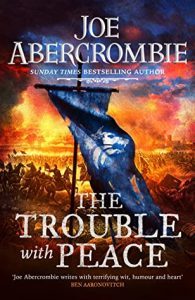 The story completely exceeded my high expectations and I enjoyed it even more than A Little Hatred. It features stunning dialogue and wit and has memorable characters who leap off the page to attack your emotions. It’s a story that I know will stay with me for a long time. To conclude, I’ll simply say that The Trouble with Peace is a masterwork of grimdark fantasy by an author who is one of the finest the genre has to offer.
The story completely exceeded my high expectations and I enjoyed it even more than A Little Hatred. It features stunning dialogue and wit and has memorable characters who leap off the page to attack your emotions. It’s a story that I know will stay with me for a long time. To conclude, I’ll simply say that The Trouble with Peace is a masterwork of grimdark fantasy by an author who is one of the finest the genre has to offer.
Read the rest of the review here.
Check out an excerpt here.
Blurb:
Conspiracy. Betrayal. Rebellion.
Peace is just another kind of battlefield…
Savine dan Glokta, once Adua’s most powerful investor, finds her judgement, fortune and reputation in tatters. But she still has all her ambitions, and no scruple will be permitted to stand in her way.
For heroes like Leo dan Brock and Stour Nightfall, only happy with swords drawn, peace is an ordeal to end as soon as possible. But grievances must be nursed, power seized and allies gathered first, while Rikke must master the power of the Long Eye . . . before it kills her.
The Breakers still lurk in the shadows, plotting to free the common man from his shackles, while noblemen bicker for their own advantage. Orso struggles to find a safe path through the maze of knives that is politics, only for his enemies, and his debts, to multiply.
The old ways are swept aside, and the old leaders with them, but those who would seize the reins of power will find no alliance, no friendship, and no peace, lasts forever.
Mike’s thoughts: The has everything we’ve come to expect from a Joe Abercrombie novel: complex characters and plot, snappy dialogue, brutal action, settings that affect the story, pitch-perfect narrative voice, and gripping emotion. And the ending is epic, surprising, and unforgettable. No, is not an unpredictable, unexpected choice, a hidden gem flying under the radar (to mix metaphors); it is exactly what the best novel of the year should be—totally fucking amazing and everyone knows it.
Read The Trouble with Peace by Joe Abercrombie
Dead Man in a Ditch by Luke Arnold
Picked by Jodie Crump
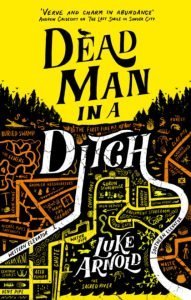 Dead Man in a Ditch is a good book and an even better series. It isn’t a typical urban fantasy story where magical creatures are supernatural power beyond human understanding. They are broken withered things; humans broke them eight years ago. Fetch broke them. Instead of approaching the story like many urban fantasy writers do where humans are weak in the face of magical power, here, humans are almost villainous.
Dead Man in a Ditch is a good book and an even better series. It isn’t a typical urban fantasy story where magical creatures are supernatural power beyond human understanding. They are broken withered things; humans broke them eight years ago. Fetch broke them. Instead of approaching the story like many urban fantasy writers do where humans are weak in the face of magical power, here, humans are almost villainous.
Read the full review here.
Check out our interview with Luke here.
Blurb:
A former soldier turned PI solves crime in a world that’s lost its magic in this brilliant sequel to actor Luke Arnold’s debut The Last Smile in Sunder City.
The name’s Fetch Phillips — what do you need?
Cover a Gnome with a crossbow while he does a dodgy deal? Sure.
Find out who killed Lance Niles, the big-shot businessman who just arrived in town? I’ll give it shot.
Help an old-lady Elf track down her husband’s murderer? That’s right up my alley.
What I don’t do, because it’s impossible, is search for a way to bring the goddamn magic back.
Rumors got out about what happened with the Professor, so now people keep asking me to fix the world.
But there’s no magic in this story. Just dead friends, twisted miracles, and a secret machine made to deliver a single shot of murder.
Welcome back to the streets of Sunder City, a darkly imagined world perfect for readers of Ben Aaronovitch and Jim Butcher.
Read Dead Man in a Ditch by Luke Arnold
Along the Razor’s Edge by Rob J. Hayes
Picked by Chris Haught
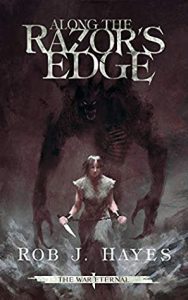 “Handshakes are a dangerous business in some parts of the world.” This quote from Along the Razor’s Edge stuck with me, though Hayes meant it in a different light than how it pertains to most of us in this Covidic world right now. Still, it was no less deadly, as it turns out.
“Handshakes are a dangerous business in some parts of the world.” This quote from Along the Razor’s Edge stuck with me, though Hayes meant it in a different light than how it pertains to most of us in this Covidic world right now. Still, it was no less deadly, as it turns out.
Read the full review here.
Read an excerpt here.
Blurb:
No one escapes the Pit.
At just fifteen Eskara Helsene fought in the greatest war mankind has ever known. Fought and lost. There is only one place her enemies would send a Sourcerer as powerful as her, the Pit, a prison sunk so deep into the earth the sun is a distant memory. Now she finds herself stripped of her magic; a young girl surrounded by thieves, murderers, and worse. In order to survive she will need to find new allies, play the inmates against each other, and find a way out. Her enemies will soon find Eskara is not so easily broken.
Read Along the Razor’s Edge by Rob J. Hayes
Black Stone Heart by Michael R. Fletcher
Picked by Nate Aubin
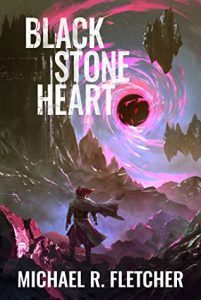 Black Stone Heart doesn’t disappoint the returning Fletcher reader. It’s much different in scope and perspective than earlier work but keeps the consistent tone and writing flow that we’ve come to look forward to with each new story. New readers will be just as entertained and will likely flock to his back catalogue as soon as they finish this one. But all readers will probably wonder about Fletcher’s sanity before it’s all over.
Black Stone Heart doesn’t disappoint the returning Fletcher reader. It’s much different in scope and perspective than earlier work but keeps the consistent tone and writing flow that we’ve come to look forward to with each new story. New readers will be just as entertained and will likely flock to his back catalogue as soon as they finish this one. But all readers will probably wonder about Fletcher’s sanity before it’s all over.
Read the full review here.
Check out an interview with the author here.
Blurb:
A broken man, Khraen awakens alone and lost. His stone heart has been shattered, littered across the world. With each piece, he regains some small shard of the man he once was.
He follows the trail, fragment by fragment, remembering his terrible past.
There was a woman.
There was a sword.
There was an end to sorrow.
Khraen walks the obsidian path.
Read Black Stone Heart by Michael R. Fletcher
The Invisible Life of Addie LaRue by V.E. Schwab
Picked by Fabienne Schwizer
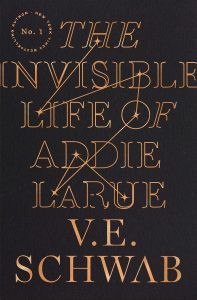 This is one of those books that have a kind of universal appeal, that people who only read the bitterest of Grimdark will find something in just as much as people who don’t really read any fantasy at all. The Invisible Life of Addie LaRue is a very special book about what it means to be human and to grow.
This is one of those books that have a kind of universal appeal, that people who only read the bitterest of Grimdark will find something in just as much as people who don’t really read any fantasy at all. The Invisible Life of Addie LaRue is a very special book about what it means to be human and to grow.
Read the full review here.
Blurb:
A Life No One Will Remember. A Story You Will Never Forget.
France, 1714: in a moment of desperation, a young woman makes a Faustian bargain to live forever and is cursed to be forgotten by everyone she meets.
Thus begins the extraordinary life of Addie LaRue, and a dazzling adventure that will play out across centuries and continents, across history and art, as a young woman learns how far she will go to leave her mark on the world.
But everything changes when, after nearly 300 years, Addie stumbles across a young man in a hidden bookstore and he remembers her name.
Read The Invisible Life of Addie LaRue by V.E. Schwab
The Worst of All Possible Worlds by Alex White
Picked by Eugene Vassilev
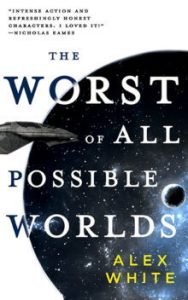 This trilogy was an absolute joy to experience and The Worst Of All Possible Worlds is its crowning achievement. While undeniably derivative, I would contend that the quality and ingenuity of this work transcends, and in many ways surpasses, its inspirations to create something unique and wonderful that you should absolutely go and enjoy. TL;DR? Firefly meets Final Fantasy…do yourself a favour and pick up all three.
This trilogy was an absolute joy to experience and The Worst Of All Possible Worlds is its crowning achievement. While undeniably derivative, I would contend that the quality and ingenuity of this work transcends, and in many ways surpasses, its inspirations to create something unique and wonderful that you should absolutely go and enjoy. TL;DR? Firefly meets Final Fantasy…do yourself a favour and pick up all three.
Read the rest of the review here.
Blurb:
The greatest dangers hide the brightest treasures in this bold, planet-hopping science fiction adventure series.
The crew of the legendary Capricious may have gone legitimate, but they’re still on the run.
With devastatingly powerful enemies in pursuit and family and friends under attack planetside, Nilah and Boots struggle to piece together rumors of an ancient technology that could lead to victory.
Ensnared by the legend of Origin, humanity’s birthplace, and a long-dead form of magic, the Capricious takes off on a journey to find the first colony ship…and magic that could bring down gods.
Read The Worst of All Possible Worlds by Alex White
Rhythm of War by Brandon Sanderson
Picked by James Tivendale
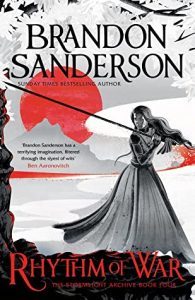 Some moments that happen throughout these pages will have the SFF scene discussing and debating them for months. Although The Stormlight Archive is due to be a ten novel series, I believe the next book will be the last of this era, making Rhythm of War the penultimate entry. Events are poised expertly at the end of this narrative for the next novel to be beyond exceptional. I’m sure this time in three years I’ll be re-reading this series again before the next book and I cannot wait. The Stormlight Archive is epic fantasy at a level that is rarely equalled.
Some moments that happen throughout these pages will have the SFF scene discussing and debating them for months. Although The Stormlight Archive is due to be a ten novel series, I believe the next book will be the last of this era, making Rhythm of War the penultimate entry. Events are poised expertly at the end of this narrative for the next novel to be beyond exceptional. I’m sure this time in three years I’ll be re-reading this series again before the next book and I cannot wait. The Stormlight Archive is epic fantasy at a level that is rarely equalled.
Read the rest of the review here.
Blurb:
After forming a coalition of human resistance against the enemy invasion, Dalinar Kholin and his Knights Radiant have spent a year fighting a protracted, brutal war. Neither side has gained an advantage, and the threat of a betrayal by Dalinar’s crafty ally Taravangian looms over every strategic move.
Now, as new technological discoveries by Navani Kholin’s scholars begin to change the face of the war, the enemy prepares a bold and dangerous operation. The arms race that follows will challenge the very core of the Radiant ideals, and potentially reveal the secrets of the ancient tower that was once the heart of their strength.
At the same time that Kaladin Stormblessed must come to grips with his changing role within the Knights Radiant, his Windrunners face their own problem: As more and more deadly enemy Fused awaken to wage war, no more honorspren are willing to bond with humans to increase the number of Radiants. Adolin and Shallan must lead the coalition’s envoy to the honorspren stronghold of Lasting Integrity and either convince the spren to join the cause against the evil god Odium, or personally face the storm of failure.
Read Rhythm of War by Brandon Sanderson
High Tower Gods by C.L. Corona
Picked by Ryan Howse
Immortality is a burden, as alchemist Elian Maxwell could tell you. Decades after gaining notoriety as one of the Chimera Three – the group responsible for creating a biomechanical AI slave class – she has become a hermit living on the outskirts of the desert. These days she has little interest in mortals.
That is, until one of her creations is framed for a murder it could not possibly commit. Jaded and emotionless, Elian only opts to save the Chimera in order to clear her own name. Back in the city she finds herself up against the only other immortal in the world, and realises that the time has come to decide if she is a human or a demigod.
Is she truly above the world and the things she has done to it, or must she set right her previous mistakes and embrace her humanity again.
Read High Tower Gods by C.L. Corona
Stormblood by Jeremy Szal
Picked by Adrian Collins
 Stormblood is a magnificent and explosive adrenaline-fest that ends with an absolute gut-punch that ties all the threads back into one tear-inducing moment. Szal’s debut is an absolute must read for fans of gritty, action-packed, detective / military SF. Whatever book two is, I’m in.
Stormblood is a magnificent and explosive adrenaline-fest that ends with an absolute gut-punch that ties all the threads back into one tear-inducing moment. Szal’s debut is an absolute must read for fans of gritty, action-packed, detective / military SF. Whatever book two is, I’m in.
Read the full review here.
Blurb:
Vakov Fukasawa used to be a Reaper: a bio-enhanced soldier fighting for the Harmony, against a brutal invading empire. He’s still fighting now, on a different battlefield: taking on stormtech. To make him a perfect soldier, Harmony injected him with the DNA of an extinct alien race, altering his body chemistry and leaving him permanently addicted to adrenaline and aggression. But although they meant to create soldiers, at the same time Harmony created a new drug market that has millions hopelessly addicted to their own body chemistry.
Vakov may have walked away from Harmony, but they still know where to find him, and his former Reaper colleagues are being murdered by someone, or something – and Vakov is appalled to learn his estranged brother is involved. Suddenly it’s an investigation he can’t turn down . . . but the closer he comes to the truth, the more addicted to stormtech he becomes.
And it’s possible the war isn’t over, after all . . .
Read Stormblood by Jeremy Szal
Honourable Mentions
There are a few other books the team mentioned that they loved that we couldn’t quite jam into our Best SFF Books of 2020 list. You can find links to our reviews below.
A Time of Courage by John Gwynne
The Light of All That Falls by James Islington
Ring Shout by P. Djèlí Clark
Vultures by Luke Tarzian
Thirteen Storeys by Jonathan Sims
Paternus: War of Gods by Dyrk Ashton
Legacy of Steel by Matthew Ward
Check out our previous years’ best of lists
What’s that you say? YOU WANT MOAR BOOK RECOMMENDATIONS? Our Best SFF Books of 2020 list wasn’t enough? Here are our last three year’s best of lists for you to sink your eyes in to.
The post Best SFF books of 2020 appeared first on Grimdark Magazine.
REVIEW: Shadow of a Dead God by Patrick Samphire
Entertaining, and full of snark, Shadow of a Dead God perfectly combines fantasy and mystery to create a book that’s nearly impossible to put down. It has all the ingredients for a great fantasy: a self-deprecating main character, a well-developed magic system, and a “small” job that rapidly gets out of control.
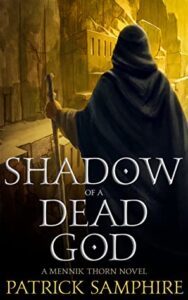 The book follows Nik, a less-than-brilliant mage who gets roped into helping his only friend, Benny. It’s always best not to owe anyone anything: Benny takes major advantage of an “I owe you” and drags Nik into a tangled mess. What starts as theft goes badly wrong, of course, and things snowball from there, turning into a murder-mystery and becoming far less straightforward than I expected things to be.
The book follows Nik, a less-than-brilliant mage who gets roped into helping his only friend, Benny. It’s always best not to owe anyone anything: Benny takes major advantage of an “I owe you” and drags Nik into a tangled mess. What starts as theft goes badly wrong, of course, and things snowball from there, turning into a murder-mystery and becoming far less straightforward than I expected things to be.
The world was fully realized. The dreaded info dump was missing, with things being explained organically as the story continues. The magic system was pretty stinking amazing. I can’t say that I’ve ever read a book where magic comes from the cadavers of gods. It was bizarre and brilliant. I would like to see that explored more in subsequent books simply because it was so unique.
In fact, where Shadow of a Dead God shines is in its ability to take common fantasy elements and make them wholly original. Nik is one of many mediocre mages in fantasy-but his lack of self-confidence, and complete unwillingness to be decisive adds a new twist. His relationship with Benny, the instigator of the trouble, is so much fun to watch. Nik is fully aware that his friendship with Benny is problematic, but there is that familial obligation mixed in with love and it makes for a fascinating dynamic.
Added to the mix is Benny’s daughter, Sereh. Now, I have kids and they can be scary, but the amount of terror she inspires in adults is next-level. I would love to see more of her story. There are so many aspects of this book that I want to see more of! I became so invested in the story that I wasn’t ready for it to end.
Shadow of a Dead God has a slower build, which I liked. It gave me time to appreciate the writing. Samphire’s descriptions were fantastic. There is never a simple, “he looked grizzled.” No, the reader is treated to descriptions such as, “I had seen corpses dragged out of buried temples that had aged better.” It is a joy to read such a great narrative voice.
Pick this book up. You’ll thank me.
Read Shadow of a Dead God by Patrick Samphire
The post REVIEW: Shadow of a Dead God by Patrick Samphire appeared first on Grimdark Magazine.
December 27, 2020
REVIEW: Fid’s Crusade by David H. Reiss
Superheroes can be complex characters, and none more so than dr. Fid in Fid’s Crusade by David H. Reiss. Gone are the days of herculean knights swooping in to save the damsel in distress while simultaneously grinning at the camera with a twinkle on a tooth. Readers are asking more of their characters. It is not enough to be super anymore; we want super and complex—no small feat. It is this desire for more is why Fid’s Crusade is such a successful story; Fid is an incredibly intricate villainous superhero.
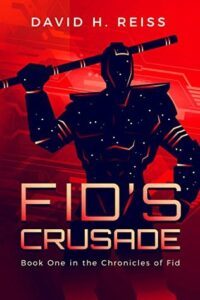 Fid’s Crusade is the story of a master villain and his endless quest to punish the unworthy. Who the real villains of the story change and develop as the narrative progresses. In that, it reminds me of Garth Ennis’s The Boys. None of that is why you would read the book. The plot in itself is interesting, but not why I kept turning pages. Fid and the roundness of his character was why I did. Essentially, Fid is a man with the temperament, intelligence, and moral compass to punish those who deserve it. And when I say punish, I mean that if Fid finds you wanting, he will rain unholy hellfire upon you, destroy everything you hold dear in life, and walk away feeling as if he did an adequate job. I appreciate the thoroughness of his villainy.
Fid’s Crusade is the story of a master villain and his endless quest to punish the unworthy. Who the real villains of the story change and develop as the narrative progresses. In that, it reminds me of Garth Ennis’s The Boys. None of that is why you would read the book. The plot in itself is interesting, but not why I kept turning pages. Fid and the roundness of his character was why I did. Essentially, Fid is a man with the temperament, intelligence, and moral compass to punish those who deserve it. And when I say punish, I mean that if Fid finds you wanting, he will rain unholy hellfire upon you, destroy everything you hold dear in life, and walk away feeling as if he did an adequate job. I appreciate the thoroughness of his villainy.
In comparison, this could have been a flat story. Reiss could have borrowed from “Batman” and Tony Stark’s cultural mythos and created an amalgamation of characters who just happened to fall on the dark side. That would have been lazy writing. What he did do was give us a broken man, wracked with pain and emotional trauma, fighting to make things right, and he gave us a character to empathize with and understand why he did horrible things. Essentially, David Reiss gave us an anti-hero who is morally gray in the form of a superhero book.
“In the end, it may take a villain to save the world from those entrusted with the world’s protection”
Fid’s Crusade by David H Reiss was the 2018 Publishers Weekly Booklife Prize winner. In an interview regarding why he tackled an antagonist, the author David Reiss said, “I read John Gardner’s Grendel when I was young. That’s a deep dive into the mind of the beast from Beowulf. Ever since then I’ve wondered what the antagonist was thinking throughout a story whenever I saw what the hero was doing. In superhero stories, the villains are more proactive. The heroes all react. The villain’s robbing a bank, so the heroes run to save the day. But the villain’s the guy that has to start things rolling. I was trying to approach the genre from what initiates conflict.”
While all that is very true. Approaching a story from a villain’s perspective because the villain’s actions are the catalyst for plot movement is different. However, all I could think of having finished Fid’s Crusade was “Every fairy tale needs a good old-fashioned villain.”
The action scenes are intense in this story. They usually involve technical jargon about Fid’s suit, weapons, and bloody battles with the “good” heroes. At the beginning of the story, this is overwhelming. We start the story right in the middle of a fight; Dr. Fid wields his weapons and intellect like a cudgel against his opponents. I wasn’t sure what I was in for from the first chapter. But as the story progresses and we get into Fid’s backstory, it becomes a much more engaging read. Instead of the technical jargon and fight scenes being the story’s meat, they become details that help us understand Fid’s intellect.
I want to be very clear; Reiss did not write this story with any pretense that the reader will like Fid. I wouldn’t say I like Fid as a person. Some of the things he does are horrifying. But that isn’t important. What is important is I loved reading about him as he is morally gray and complicated.
I empathized with his journey, and I understood the foundations of his villainy.
Even when he starts moving away from his violent tendencies and finds some peace, and yet again is faced with a personal tragedy that sends him reeling to the dark side, I got it. When a reader can empathize and understand a character like that, it is good engaging writing.
Fid’s Crusade is a complicated story to explain pacing wise. Reiss takes a long time with nuanced writing to explain Dr. Fids backstory. It is smart in that it would be very easy for a reader to fall into a trap of not liking Fid and not empathizing with his plights. However, because of the nuanced writing and the time Reiss took to create a clear mental picture of Fid as a villain, I didn’t have that issue. But, because of the long buildup for Fid, I found the novel slowing down a bit.
All of the detailing Reiss was putting in was important, but I can see some readers feeling like that section of the story is overlong. I think how you react to the first section of the book will come down to personal preference. It all becomes seamless as plot and character creation come slamming together, but it is a meandering path.
Fid’s Crusade stands heads above its superhero novel contemporaries. While some readers may have difficulty with Reiss’s meandering path to the plot denouement, I found that it was all worth it. Fid’s Crusade is a great story, well worth the time reading it.
I am looking forward to checking out the other books in the series.
Read Fid’s Crusade by David H. Reiss
The post REVIEW: Fid’s Crusade by David H. Reiss appeared first on Grimdark Magazine.

